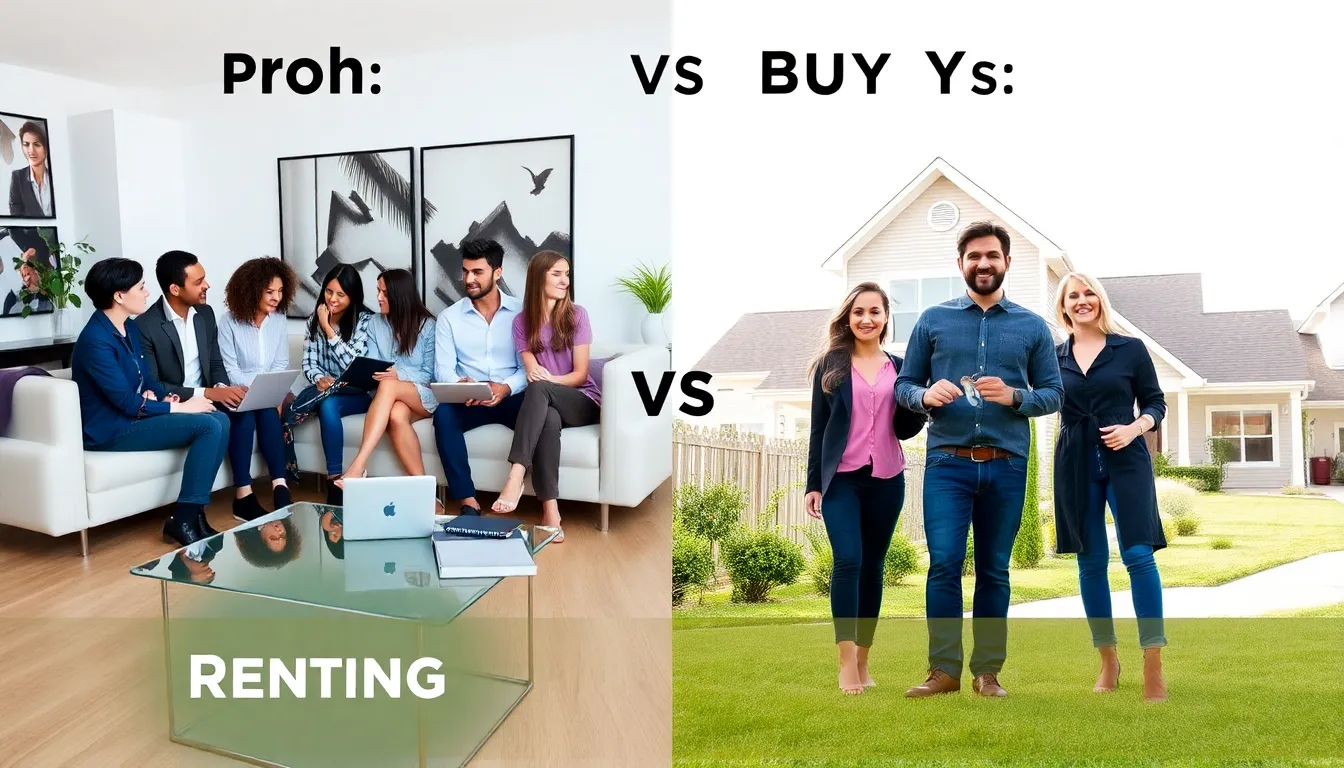When it comes to the age-old debate of renting versus buying a house, the stakes are high, not just for your financial future, but for your sanity, too. Whether you’re a free spirit wanting to roam or a homebody who dreams of a white picket fence, this article is here to break down the pros and cons of each option. Spoiler alert: both renting and buying come with their perks and pitfalls. So, grab your calculator, and let’s jump into the world of real estate decisions that could either make you a homeowner or keep you living in your cozy rental.
Table of Contents
ToggleUnderstanding the Basics of Renting and Buying

Renting involves paying a monthly fee to live in a property owned by someone else. It’s usually pretty straightforward. You sign a lease, pay your landlord, and, voilà, you have a place to call home. On the other hand, buying a house means investing a hefty sum into a property that can eventually become an asset. But, unlike renting, ownership comes with a long-term commitment, mortgage payments, and responsibilities galore. Both options have their respective nuances, appeal, and challenges. Let’s break it down further.
Pros of Renting a House
Flexibility and Mobility
Renting offers the luxury of flexibility. Want to move to a new city for a job? No problem. All it takes is a bit of notice to your landlord. For many, this mobility allows for exciting life changes without the burden of selling a home.
Lower Upfront Costs
Usually, the initial costs of renting are significantly lower than buying. First month’s rent and a security deposit can often get you moving into a new place, no need to cough up tens of thousands for a down payment.
Maintenance Responsibilities
One more cherry on top: if the air conditioning breaks or the plumbing goes haywire, it’s not your problem. Renters usually have the advantage here, as their landlords handle repairs and maintenance.
Cons of Renting a House
Lack of Equity Building
Here’s the thing: while renters enjoy flexibility, they’re not building any equity. Monthly payments go to the landlord, not towards an investment that can appreciate over time. It’s like pouring money down a black hole.
Potential for Rent Increases
Unfortunately, renting also includes the potential for rent hikes. While your initial lease might be the right price, market conditions can change, and so can your rent.
Limited Customization
Finally, renters typically face restrictions on personalizing their living space. Want to paint the walls magenta? Not without a landlord’s approval. This can make a rented space feel less like home.
Pros of Buying a House
Building Equity and Wealth
One major selling point of buying is that it allows for wealth building over time. As mortgage payments are made, ownership builds equity. You’re investing in your future, think of it as a savings plan with a roof.
Stability and Predictability
Owning a home brings stability. Mortgage payments can remain stable (if you choose a fixed rate), providing predictable monthly expenses. This can be a comforting contrast to the uncertainties of rental prices.
Freedom to Customize
Let’s be honest: who doesn’t dream of repainting walls or gutting a kitchen? Homeowners have the freedom to customize their space but they wish. Want a hot pink living room? Go for it. The design decisions are entirely in their hands.
Cons of Buying a House
High Upfront Costs and Closing Fees
Buying a home comes with hefty upfront costs. Down payments, closing fees, and inspections add up fast. Be prepared to open your wallet wide, it’s not just the list price that counts.
Less Flexibility
Once you’ve purchased a home, moving isn’t quite as easy. Personal or career changes may require you to sell, which can be time-consuming and stressful. For someone who likes to keep their options open, this could be a deal-breaker.
Maintenance Responsibilities and Unexpected Costs
Homeownership also means taking care of all the repairs, nobody’s fixing that leaky roof for you. These unexpected costs can add financial strain, depending on the age and condition of the home.
Making the Right Decision for You
Evaluating Personal Financial Situation
Deciding between renting and buying? Start by evaluating your financial situation. Look closely at savings, debts, and income stability. Are you ready to commit to a mortgage, or is keeping your flexibility more important?
Consideration of Lifestyle and Future Plans
Next, consider your lifestyle preferences and future plans. If you’re in a career that requires relocation, renting likely makes more sense. On the other hand, if you’re settled in a community and plan to stick around, buying could be the smarter choice.








